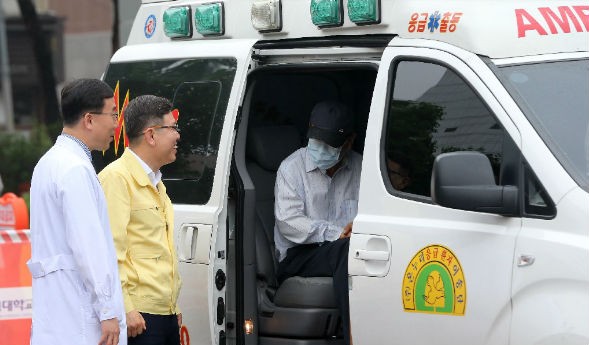- California Assembly OKs highest minimum wage in nation
- S. Korea unveils first graphic cigarette warnings
- US joins with South Korea, Japan in bid to deter North Korea
- LPGA golfer Chun In-gee finally back in action
- S. Korea won’t be top seed in final World Cup qualification round
- US men’s soccer misses 2nd straight Olympics
- US back on track in qualifying with 4-0 win over Guatemala
- High-intensity workout injuries spawn cottage industry
- CDC expands range of Zika mosquitoes into parts of Northeast
- Who knew? ‘The Walking Dead’ is helping families connect
No new cases of MERS reported for two days in S. Korea

Health ministry officials noted no new infections for two consecutive days may indicate that the outbreak may be weakening. (Yonhap)
(Yonhap) — South Korea reported no additional cases of Middle East Respiratory Syndrome (MERS) for a second consecutive day Monday, possibly indicating that the outbreak of the acute respiratory illness that has claimed 32 lives so far is on the wane.
The death toll also remained unchanged from the previous day, according to the Ministry of Health and Welfare.
It marked the first time in over a month that the country had reported no additional infection cases for two straight days.
South Korea reported its first-ever MERS case on May 20. As of Monday, 182 people had been diagnosed with the potentially deadly disease.
Out of those diagnosed, 57 still remain hospitalized while 14 of them are currently in critical condition, according to the ministry.
The remaining 93 have been discharged from hospitals following complete recoveries. The number increased from 91 on Sunday.
Health ministry officials noted no new infections for two consecutive days may indicate that the outbreak may be weakening.
However, 2,682 people still remained in isolation as suspected cases as of Monday. The number increased slightly from 2,562 on the previous day.
Since the country reported its first case, a total of 15,818 people have been subject to quarantine or isolation, mostly at their own homes, for possible infection after coming in close contact with MERS patients.
Over 13,000 of them have been released after they showed no symptoms of MERS for more than the known incubation period of 14 days for the disease.
MERS is a viral respiratory disease first identified in Saudi Arabia in 2012. Only some 1,100 cases had been reported globally with the fatality rate of the disease tallied at over 40 percent until the outbreak here as there currently is no vaccine or treatment for the disease.
In South Korea, the fatality rate of the disease remains at 17.6 percent.
Over 90 percent, or 29, of the 32 fatalities here involved either people with existing health conditions, including diabetes and cancer, or those of old age, the ministry has said.
The World Health Organization has noted no community transmission of the disease has occurred in South Korea while pointing to the country’s tradition of family members staying with their loved ones in hospital rooms as a factor driving the outbreak here.
The country’s health ministry also maintains that nearly all infections here have occurred at hospitals, with possibly the only exception involving an ambulance driver and a paramedic who helped transport MERS patients.









![그룹 방탄소년단(BTS) [BTS 공식 트위터. 재판매 및 DB 금지]](http://www.koreatimesus.com/wp-content/uploads/2025/07/Untitled-5-copy-199x223.jpg)






